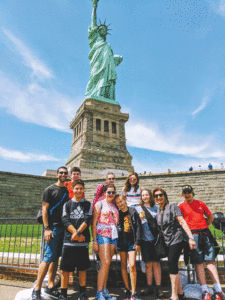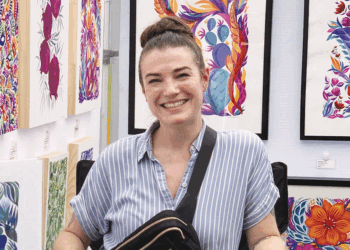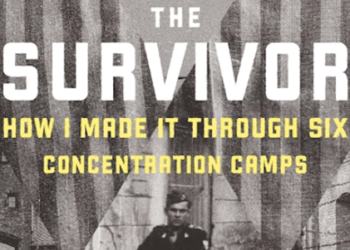“I never saw this kind of thing in Minneapolis,” said Leo Kaufman.
Leo just returned from an eye-opening trip to New York City with his Zayin class (7th grade) at Talmud Torah of Minneapolis.

“We went on a walking tour through an ultra-orthodox Jewish neighborhood. Throughout the trip, we also saw how Conservative and Reform Judaism touched the city,” said Leo. “By walking through those neighborhoods, we learned how these types of Judaism influenced not just New York, but the Jewish community [at large]. I didn’t really understand that until I saw it firsthand.”
This trip, and these types of experiences, are part of Talmud Torah’s innovative effort to help students learn by engaging all their senses. The approach is called experiential education, and it’s drastically changing the way students consume information.
“A lot of studies show that the more senses you involve in learning, the more likely you are to remember it and the more impactful it will be to you,” said Avi Baron, 7th grade teacher and trip facilitator. “If we can have a lesson plan, but then go out and really see it and feel it and even have ice cream while doing it, that’s so much more powerful!”
Pam Kermisch, whose daughter Gracie went on the trip, agrees. “I think experiential learning is game changing,” she said. “I knew the trip would bring her a whole different sense of understanding of Jewish culture. They got to see a part of Judaism that they just don’t see in a siddur or learning Hebrew. [That experience] is broadening their perspectives of Judaism.”
Sophie Gold also attended the trip and enjoyed the opportunity to learn outside of the classroom. “It’s one thing to read ‘immigrants walked through this hallway’ in a textbook, but to go [to Ellis Island] and see it, to actually walk through that exact hallway, I felt like, wow! This is where people saw our country for the first time and started a new life.”
Experiential education doesn’t just help engage students, it builds community as well. “One of the main missions of Talmud Torah is to create a space for intentional Jewish living and to develop a thriving community. We feel that offering educational experiences that instill that sense of community makes all the difference,” said Hazzan Jeremy Lipton, Talmud Torah’s new head of school.
As a staff member and teacher to these students, Avi also feels community-building for these students is pivotal. “It seems supplemental Jewish schools are primarily about keeping Judaism alive. One of the crucial aspects is having students bond with one another and become friends. Because of this trip, people that weren’t friends are now, and now they have a strong reason to come back to Talmud Torah and are more likely to continue their Jewish education for years after they graduate.”
Keeping Judaism alive and instilling connections to a Jewish community is exactly what this trip did for Sophia Perepelitsyn, another attendee. “Because of this trip, I feel like I am a lot more aware of the other types of Judaism, Jewish history, and the immigration of Jews. Even more, though, I feel I’m much more aware of what Judaism is for me. [This trip] helped me expand my horizons.” she said.
Talmud Torah’s staff and the students would like to thank the generous donors who made this trip possible.
— Talmud Torah of Minneapolis





















